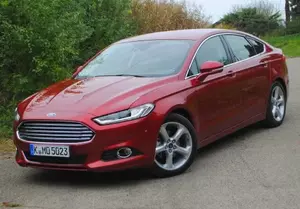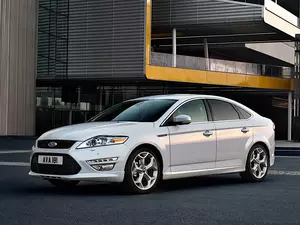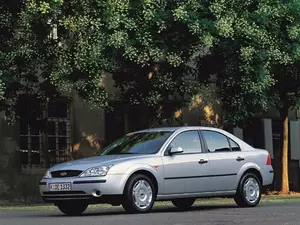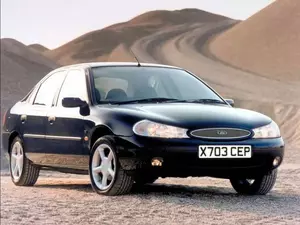


Mondeo Hatchback IV

Mondeo Sedan IV

Mondeo Wagon IV

Mondeo Hatchback III (facelift 2010)

Mondeo Wagon III (facelift 2010)

Mondeo Wagon III

Mondeo Hatchback III

Mondeo Sedan III

Mondeo Hatchback II

Mondeo Wagon II

Mondeo Sedan II

Mondeo Seadn I (facelift 1996)

Mondeo Wagon I (facelift 1996)

Mondeo Hatchback I (facelift 1996)

Mondeo Hatchback I

Mondeo Wagon I

Mondeo Sedan I

| Vehicle | Precise engine size | Difference from world average | Engine size to consumption ratio | Horsepower from 1 L | Engine size to 100 kg of weight |
|---|---|---|---|---|---|
| 2.0 TDCi |
2 L (1997 cc) |
14.9% smaller | 41 cc to 1 mpg | 105 hp from 1 L | 133 cc to 100 kg |
| 1.0 EcoBoost |
1 L (998 cc) |
57.5% smaller | 22 cc to 1 mpg | 125 hp from 1 L | 67 cc to 100 kg |
| 1.6 TDCi |
1.56 L (1560 cc) |
33.5% smaller | 28 cc to 1 mpg | 74 hp from 1 L | 104 cc to 100 kg |
| 1.5 EcoBoost |
1.5 L (1498 cc) |
36.1% smaller | 40 cc to 1 mpg | 107 hp from 1 L | 100 cc to 100 kg |
| 2.0 EcoBoost |
2 L (1999 cc) |
14.8% smaller | 62 cc to 1 mpg | 120 hp from 1 L | 125 cc to 100 kg |
| 1.5 TDCi |
1.5 L (1499 cc) |
36.1% smaller | 25 cc to 1 mpg | 80 hp from 1 L | - |
| Vehicle | 2.0 TDCi |
|---|---|
| Precise engine size | 2 L (1997 cc) |
| Difference from world average | 14.9 smaller |
| Engine size to consumption ratio | 41 cc to 1 mpg |
| Horsepower from 1 L | 105 hp from 1 L |
| Engine size to 100 kg of weight | 133 cc to 100 kg |
| Vehicle | 1.0 EcoBoost |
| Precise engine size | 1 L (998 cc) |
| Difference from world average | 57.5 smaller |
| Engine size to consumption ratio | 22 cc to 1 mpg |
| Horsepower from 1 L | 125 hp from 1 L |
| Engine size to 100 kg of weight | 67 cc to 100 kg |
| Vehicle | 1.6 TDCi |
| Precise engine size | 1.56 L (1560 cc) |
| Difference from world average | 33.5 smaller |
| Engine size to consumption ratio | 28 cc to 1 mpg |
| Horsepower from 1 L | 74 hp from 1 L |
| Engine size to 100 kg of weight | 104 cc to 100 kg |
| Vehicle | 1.5 EcoBoost |
| Precise engine size | 1.5 L (1498 cc) |
| Difference from world average | 36.1 smaller |
| Engine size to consumption ratio | 40 cc to 1 mpg |
| Horsepower from 1 L | 107 hp from 1 L |
| Engine size to 100 kg of weight | 100 cc to 100 kg |
| Vehicle | 2.0 EcoBoost |
| Precise engine size | 2 L (1999 cc) |
| Difference from world average | 14.8 smaller |
| Engine size to consumption ratio | 62 cc to 1 mpg |
| Horsepower from 1 L | 120 hp from 1 L |
| Engine size to 100 kg of weight | 125 cc to 100 kg |
| Vehicle | 1.5 TDCi |
| Precise engine size | 1.5 L (1499 cc) |
| Difference from world average | 36.1 smaller |
| Engine size to consumption ratio | 25 cc to 1 mpg |
| Horsepower from 1 L | 80 hp from 1 L |
| Engine size to 100 kg of weight | - |

| Vehicle | Precise engine size | Difference from world average | Engine size to consumption ratio | Horsepower from 1 L | Engine size to 100 kg of weight |
|---|---|---|---|---|---|
| 1.0 EcoBoost |
1 L (998 cc) |
57.5% smaller | 22 cc to 1 mpg | 125 hp from 1 L | 67 cc to 100 kg |
| 1.5 EcoBoost |
1.5 L (1498 cc) |
36.1% smaller | 40 cc to 1 mpg | 107 hp from 1 L | 100 cc to 100 kg |
| 1.6 TDCi |
1.56 L (1560 cc) |
33.5% smaller | 28 cc to 1 mpg | 74 hp from 1 L | 104 cc to 100 kg |
| 2.0 TDCi |
2 L (1997 cc) |
14.9% smaller | 41 cc to 1 mpg | 105 hp from 1 L | 133 cc to 100 kg |
| 2.0 EcoBoost |
2 L (1999 cc) |
14.8% smaller | 62 cc to 1 mpg | 102 hp from 1 L | 125 cc to 100 kg |
| 2.0 iVCT |
2 L (1999 cc) |
14.8% smaller | 36 cc to 1 mpg | 94 hp from 1 L | 133 cc to 100 kg |
| 1.5 TDCi |
1.5 L (1499 cc) |
36.1% smaller | 25 cc to 1 mpg | 80 hp from 1 L | - |
| Vehicle | 1.0 EcoBoost |
|---|---|
| Precise engine size | 1 L (998 cc) |
| Difference from world average | 57.5 smaller |
| Engine size to consumption ratio | 22 cc to 1 mpg |
| Horsepower from 1 L | 125 hp from 1 L |
| Engine size to 100 kg of weight | 67 cc to 100 kg |
| Vehicle | 1.5 EcoBoost |
| Precise engine size | 1.5 L (1498 cc) |
| Difference from world average | 36.1 smaller |
| Engine size to consumption ratio | 40 cc to 1 mpg |
| Horsepower from 1 L | 107 hp from 1 L |
| Engine size to 100 kg of weight | 100 cc to 100 kg |
| Vehicle | 1.6 TDCi |
| Precise engine size | 1.56 L (1560 cc) |
| Difference from world average | 33.5 smaller |
| Engine size to consumption ratio | 28 cc to 1 mpg |
| Horsepower from 1 L | 74 hp from 1 L |
| Engine size to 100 kg of weight | 104 cc to 100 kg |
| Vehicle | 2.0 TDCi |
| Precise engine size | 2 L (1997 cc) |
| Difference from world average | 14.9 smaller |
| Engine size to consumption ratio | 41 cc to 1 mpg |
| Horsepower from 1 L | 105 hp from 1 L |
| Engine size to 100 kg of weight | 133 cc to 100 kg |
| Vehicle | 2.0 EcoBoost |
| Precise engine size | 2 L (1999 cc) |
| Difference from world average | 14.8 smaller |
| Engine size to consumption ratio | 62 cc to 1 mpg |
| Horsepower from 1 L | 102 hp from 1 L |
| Engine size to 100 kg of weight | 125 cc to 100 kg |
| Vehicle | 2.0 iVCT |
| Precise engine size | 2 L (1999 cc) |
| Difference from world average | 14.8 smaller |
| Engine size to consumption ratio | 36 cc to 1 mpg |
| Horsepower from 1 L | 94 hp from 1 L |
| Engine size to 100 kg of weight | 133 cc to 100 kg |
| Vehicle | 1.5 TDCi |
| Precise engine size | 1.5 L (1499 cc) |
| Difference from world average | 36.1 smaller |
| Engine size to consumption ratio | 25 cc to 1 mpg |
| Horsepower from 1 L | 80 hp from 1 L |
| Engine size to 100 kg of weight | - |

| Vehicle | Precise engine size | Difference from world average | Engine size to consumption ratio | Horsepower from 1 L | Engine size to 100 kg of weight |
|---|---|---|---|---|---|
| 1.5 EcoBoost |
1.5 L (1498 cc) |
36.1% smaller | 42 cc to 1 mpg | 107 hp from 1 L | 100 cc to 100 kg |
| 1.6 TDCi |
1.56 L (1560 cc) |
33.5% smaller | 28 cc to 1 mpg | 74 hp from 1 L | 104 cc to 100 kg |
| 1.0 EcoBoost |
1 L (998 cc) |
57.5% smaller | 22 cc to 1 mpg | 125 hp from 1 L | 67 cc to 100 kg |
| 2.0 TDCi |
2 L (1997 cc) |
14.9% smaller | 42 cc to 1 mpg | 105 hp from 1 L | 133 cc to 100 kg |
| 2.0 EcoBoost |
2 L (1999 cc) |
14.8% smaller | 64 cc to 1 mpg | 120 hp from 1 L | 125 cc to 100 kg |
| 1.5 TDCi |
1.5 L (1499 cc) |
36.1% smaller | 26 cc to 1 mpg | 80 hp from 1 L | - |
| Vehicle | 1.5 EcoBoost |
|---|---|
| Precise engine size | 1.5 L (1498 cc) |
| Difference from world average | 36.1 smaller |
| Engine size to consumption ratio | 42 cc to 1 mpg |
| Horsepower from 1 L | 107 hp from 1 L |
| Engine size to 100 kg of weight | 100 cc to 100 kg |
| Vehicle | 1.6 TDCi |
| Precise engine size | 1.56 L (1560 cc) |
| Difference from world average | 33.5 smaller |
| Engine size to consumption ratio | 28 cc to 1 mpg |
| Horsepower from 1 L | 74 hp from 1 L |
| Engine size to 100 kg of weight | 104 cc to 100 kg |
| Vehicle | 1.0 EcoBoost |
| Precise engine size | 1 L (998 cc) |
| Difference from world average | 57.5 smaller |
| Engine size to consumption ratio | 22 cc to 1 mpg |
| Horsepower from 1 L | 125 hp from 1 L |
| Engine size to 100 kg of weight | 67 cc to 100 kg |
| Vehicle | 2.0 TDCi |
| Precise engine size | 2 L (1997 cc) |
| Difference from world average | 14.9 smaller |
| Engine size to consumption ratio | 42 cc to 1 mpg |
| Horsepower from 1 L | 105 hp from 1 L |
| Engine size to 100 kg of weight | 133 cc to 100 kg |
| Vehicle | 2.0 EcoBoost |
| Precise engine size | 2 L (1999 cc) |
| Difference from world average | 14.8 smaller |
| Engine size to consumption ratio | 64 cc to 1 mpg |
| Horsepower from 1 L | 120 hp from 1 L |
| Engine size to 100 kg of weight | 125 cc to 100 kg |
| Vehicle | 1.5 TDCi |
| Precise engine size | 1.5 L (1499 cc) |
| Difference from world average | 36.1 smaller |
| Engine size to consumption ratio | 26 cc to 1 mpg |
| Horsepower from 1 L | 80 hp from 1 L |
| Engine size to 100 kg of weight | - |

| Vehicle | Precise engine size | Difference from world average | Engine size to consumption ratio | Horsepower from 1 L | Engine size to 100 kg of weight |
|---|---|---|---|---|---|
| 2.0 EcoBoost |
2 L (1999 cc) |
14.8% smaller | 64 cc to 1 mpg | 120 hp from 1 L | 125 cc to 100 kg |
| 1.6 16V |
1.6 L (1596 cc) |
32% smaller | 46 cc to 1 mpg | 75 hp from 1 L | 114 cc to 100 kg |
| 2.0 TDCI |
2 L (1997 cc) |
14.9% smaller | 48 cc to 1 mpg | 82 hp from 1 L | 125 cc to 100 kg |
| 2.0 16V |
2 L (1999 cc) |
14.8% smaller | 67 cc to 1 mpg | 73 hp from 1 L | 133 cc to 100 kg |
| 2.2 TDCI |
2.18 L (2179 cc) |
7.1% smaller | 56 cc to 1 mpg | 92 hp from 1 L | 136 cc to 100 kg |
| Vehicle | 2.0 EcoBoost |
|---|---|
| Precise engine size | 2 L (1999 cc) |
| Difference from world average | 14.8 smaller |
| Engine size to consumption ratio | 64 cc to 1 mpg |
| Horsepower from 1 L | 120 hp from 1 L |
| Engine size to 100 kg of weight | 125 cc to 100 kg |
| Vehicle | 1.6 16V |
| Precise engine size | 1.6 L (1596 cc) |
| Difference from world average | 32 smaller |
| Engine size to consumption ratio | 46 cc to 1 mpg |
| Horsepower from 1 L | 75 hp from 1 L |
| Engine size to 100 kg of weight | 114 cc to 100 kg |
| Vehicle | 2.0 TDCI |
| Precise engine size | 2 L (1997 cc) |
| Difference from world average | 14.9 smaller |
| Engine size to consumption ratio | 48 cc to 1 mpg |
| Horsepower from 1 L | 82 hp from 1 L |
| Engine size to 100 kg of weight | 125 cc to 100 kg |
| Vehicle | 2.0 16V |
| Precise engine size | 2 L (1999 cc) |
| Difference from world average | 14.8 smaller |
| Engine size to consumption ratio | 67 cc to 1 mpg |
| Horsepower from 1 L | 73 hp from 1 L |
| Engine size to 100 kg of weight | 133 cc to 100 kg |
| Vehicle | 2.2 TDCI |
| Precise engine size | 2.18 L (2179 cc) |
| Difference from world average | 7.1 smaller |
| Engine size to consumption ratio | 56 cc to 1 mpg |
| Horsepower from 1 L | 92 hp from 1 L |
| Engine size to 100 kg of weight | 136 cc to 100 kg |

| Vehicle | Precise engine size | Difference from world average | Engine size to consumption ratio | Horsepower from 1 L | Engine size to 100 kg of weight |
|---|---|---|---|---|---|
| 2.0 EcoBoost |
2 L (1999 cc) |
14.8% smaller | 64 cc to 1 mpg | 120 hp from 1 L | 125 cc to 100 kg |
| 2.0 TDCI |
2 L (1997 cc) |
14.9% smaller | 48 cc to 1 mpg | 70 hp from 1 L | 125 cc to 100 kg |
| 1.6 16V |
1.6 L (1596 cc) |
32% smaller | 46 cc to 1 mpg | 75 hp from 1 L | 106 cc to 100 kg |
| 2.0 16V |
2 L (1999 cc) |
14.8% smaller | 67 cc to 1 mpg | 73 hp from 1 L | 133 cc to 100 kg |
| 2.2 TDCI |
2.18 L (2179 cc) |
7.1% smaller | 56 cc to 1 mpg | 92 hp from 1 L | 136 cc to 100 kg |
| Vehicle | 2.0 EcoBoost |
|---|---|
| Precise engine size | 2 L (1999 cc) |
| Difference from world average | 14.8 smaller |
| Engine size to consumption ratio | 64 cc to 1 mpg |
| Horsepower from 1 L | 120 hp from 1 L |
| Engine size to 100 kg of weight | 125 cc to 100 kg |
| Vehicle | 2.0 TDCI |
| Precise engine size | 2 L (1997 cc) |
| Difference from world average | 14.9 smaller |
| Engine size to consumption ratio | 48 cc to 1 mpg |
| Horsepower from 1 L | 70 hp from 1 L |
| Engine size to 100 kg of weight | 125 cc to 100 kg |
| Vehicle | 1.6 16V |
| Precise engine size | 1.6 L (1596 cc) |
| Difference from world average | 32 smaller |
| Engine size to consumption ratio | 46 cc to 1 mpg |
| Horsepower from 1 L | 75 hp from 1 L |
| Engine size to 100 kg of weight | 106 cc to 100 kg |
| Vehicle | 2.0 16V |
| Precise engine size | 2 L (1999 cc) |
| Difference from world average | 14.8 smaller |
| Engine size to consumption ratio | 67 cc to 1 mpg |
| Horsepower from 1 L | 73 hp from 1 L |
| Engine size to 100 kg of weight | 133 cc to 100 kg |
| Vehicle | 2.2 TDCI |
| Precise engine size | 2.18 L (2179 cc) |
| Difference from world average | 7.1 smaller |
| Engine size to consumption ratio | 56 cc to 1 mpg |
| Horsepower from 1 L | 92 hp from 1 L |
| Engine size to 100 kg of weight | 136 cc to 100 kg |

| Vehicle | Precise engine size | Difference from world average | Engine size to consumption ratio | Horsepower from 1 L | Engine size to 100 kg of weight |
|---|---|---|---|---|---|
| 1.6 i 16V |
1.6 L (1596 cc) |
32% smaller | 50 cc to 1 mpg | 78 hp from 1 L | 114 cc to 100 kg |
| 2.0 TDCi |
2 L (1997 cc) |
14.9% smaller | 50 cc to 1 mpg | 70 hp from 1 L | 133 cc to 100 kg |
| 2.0 i 16V |
2 L (1999 cc) |
14.8% smaller | 67 cc to 1 mpg | 73 hp from 1 L | 143 cc to 100 kg |
| 2.2 TDCi |
2.18 L (2179 cc) |
7.1% smaller | 57 cc to 1 mpg | 80 hp from 1 L | 145 cc to 100 kg |
| 2.3 i 16V |
2.26 L (2261 cc) |
3.6% smaller | 90 cc to 1 mpg | 71 hp from 1 L | 151 cc to 100 kg |
| 2.5 i 20V |
2.52 L (2522 cc) |
7.5% bigger | 101 cc to 1 mpg | 87 hp from 1 L | 168 cc to 100 kg |
| Vehicle | 1.6 i 16V |
|---|---|
| Precise engine size | 1.6 L (1596 cc) |
| Difference from world average | 32 smaller |
| Engine size to consumption ratio | 50 cc to 1 mpg |
| Horsepower from 1 L | 78 hp from 1 L |
| Engine size to 100 kg of weight | 114 cc to 100 kg |
| Vehicle | 2.0 TDCi |
| Precise engine size | 2 L (1997 cc) |
| Difference from world average | 14.9 smaller |
| Engine size to consumption ratio | 50 cc to 1 mpg |
| Horsepower from 1 L | 70 hp from 1 L |
| Engine size to 100 kg of weight | 133 cc to 100 kg |
| Vehicle | 2.0 i 16V |
| Precise engine size | 2 L (1999 cc) |
| Difference from world average | 14.8 smaller |
| Engine size to consumption ratio | 67 cc to 1 mpg |
| Horsepower from 1 L | 73 hp from 1 L |
| Engine size to 100 kg of weight | 143 cc to 100 kg |
| Vehicle | 2.2 TDCi |
| Precise engine size | 2.18 L (2179 cc) |
| Difference from world average | 7.1 smaller |
| Engine size to consumption ratio | 57 cc to 1 mpg |
| Horsepower from 1 L | 80 hp from 1 L |
| Engine size to 100 kg of weight | 145 cc to 100 kg |
| Vehicle | 2.3 i 16V |
| Precise engine size | 2.26 L (2261 cc) |
| Difference from world average | 3.6 smaller |
| Engine size to consumption ratio | 90 cc to 1 mpg |
| Horsepower from 1 L | 71 hp from 1 L |
| Engine size to 100 kg of weight | 151 cc to 100 kg |
| Vehicle | 2.5 i 20V |
| Precise engine size | 2.52 L (2522 cc) |
| Difference from world average | 7.5 bigger |
| Engine size to consumption ratio | 101 cc to 1 mpg |
| Horsepower from 1 L | 87 hp from 1 L |
| Engine size to 100 kg of weight | 168 cc to 100 kg |

| Vehicle | Precise engine size | Difference from world average | Engine size to consumption ratio | Horsepower from 1 L | Engine size to 100 kg of weight |
|---|---|---|---|---|---|
| 1.6 i 16V |
1.6 L (1598 cc) |
31.9% smaller | 48 cc to 1 mpg | 69 hp from 1 L | 107 cc to 100 kg |
| 2.0 i 16V |
2 L (1999 cc) |
14.8% smaller | 67 cc to 1 mpg | 73 hp from 1 L | 133 cc to 100 kg |
| 2.0 TDCi |
2 L (1997 cc) |
14.9% smaller | 61 cc to 1 mpg | 65 hp from 1 L | 133 cc to 100 kg |
| 1.6i 16v |
1.6 L (1596 cc) |
32% smaller | 50 cc to 1 mpg | 78 hp from 1 L | 106 cc to 100 kg |
| 2.2 TDCi |
2.18 L (2179 cc) |
7.1% smaller | 57 cc to 1 mpg | 80 hp from 1 L | 145 cc to 100 kg |
| 2.5 i 20V |
2.52 L (2522 cc) |
7.5% bigger | 101 cc to 1 mpg | 87 hp from 1 L | 168 cc to 100 kg |
| 2.3 i 16V |
2.26 L (2261 cc) |
3.6% smaller | 90 cc to 1 mpg | 71 hp from 1 L | 151 cc to 100 kg |
| Vehicle | 1.6 i 16V |
|---|---|
| Precise engine size | 1.6 L (1598 cc) |
| Difference from world average | 31.9 smaller |
| Engine size to consumption ratio | 48 cc to 1 mpg |
| Horsepower from 1 L | 69 hp from 1 L |
| Engine size to 100 kg of weight | 107 cc to 100 kg |
| Vehicle | 2.0 i 16V |
| Precise engine size | 2 L (1999 cc) |
| Difference from world average | 14.8 smaller |
| Engine size to consumption ratio | 67 cc to 1 mpg |
| Horsepower from 1 L | 73 hp from 1 L |
| Engine size to 100 kg of weight | 133 cc to 100 kg |
| Vehicle | 2.0 TDCi |
| Precise engine size | 2 L (1997 cc) |
| Difference from world average | 14.9 smaller |
| Engine size to consumption ratio | 61 cc to 1 mpg |
| Horsepower from 1 L | 65 hp from 1 L |
| Engine size to 100 kg of weight | 133 cc to 100 kg |
| Vehicle | 1.6i 16v |
| Precise engine size | 1.6 L (1596 cc) |
| Difference from world average | 32 smaller |
| Engine size to consumption ratio | 50 cc to 1 mpg |
| Horsepower from 1 L | 78 hp from 1 L |
| Engine size to 100 kg of weight | 106 cc to 100 kg |
| Vehicle | 2.2 TDCi |
| Precise engine size | 2.18 L (2179 cc) |
| Difference from world average | 7.1 smaller |
| Engine size to consumption ratio | 57 cc to 1 mpg |
| Horsepower from 1 L | 80 hp from 1 L |
| Engine size to 100 kg of weight | 145 cc to 100 kg |
| Vehicle | 2.5 i 20V |
| Precise engine size | 2.52 L (2522 cc) |
| Difference from world average | 7.5 bigger |
| Engine size to consumption ratio | 101 cc to 1 mpg |
| Horsepower from 1 L | 87 hp from 1 L |
| Engine size to 100 kg of weight | 168 cc to 100 kg |
| Vehicle | 2.3 i 16V |
| Precise engine size | 2.26 L (2261 cc) |
| Difference from world average | 3.6 smaller |
| Engine size to consumption ratio | 90 cc to 1 mpg |
| Horsepower from 1 L | 71 hp from 1 L |
| Engine size to 100 kg of weight | 151 cc to 100 kg |

| Vehicle | Precise engine size | Difference from world average | Engine size to consumption ratio | Horsepower from 1 L | Engine size to 100 kg of weight |
|---|---|---|---|---|---|
| 1.6 i 16V |
1.6 L (1596 cc) |
32% smaller | 50 cc to 1 mpg | 78 hp from 1 L | 114 cc to 100 kg |
| 1.8 TDCi |
1.75 L (1753 cc) |
25.3% smaller | 43 cc to 1 mpg | 71 hp from 1 L | 117 cc to 100 kg |
| 2.0 TDCi |
2 L (1997 cc) |
14.9% smaller | 50 cc to 1 mpg | 70 hp from 1 L | 133 cc to 100 kg |
| 2.0 i 16V |
2 L (1999 cc) |
14.8% smaller | 67 cc to 1 mpg | 73 hp from 1 L | 143 cc to 100 kg |
| 2.2 TDCi |
2.18 L (2179 cc) |
7.1% smaller | 57 cc to 1 mpg | 80 hp from 1 L | 145 cc to 100 kg |
| 2.3 i 16V |
2.26 L (2261 cc) |
3.6% smaller | 90 cc to 1 mpg | 71 hp from 1 L | 151 cc to 100 kg |
| 2.5 i 20V |
2.52 L (2522 cc) |
7.5% bigger | 101 cc to 1 mpg | 87 hp from 1 L | 168 cc to 100 kg |
| Vehicle | 1.6 i 16V |
|---|---|
| Precise engine size | 1.6 L (1596 cc) |
| Difference from world average | 32 smaller |
| Engine size to consumption ratio | 50 cc to 1 mpg |
| Horsepower from 1 L | 78 hp from 1 L |
| Engine size to 100 kg of weight | 114 cc to 100 kg |
| Vehicle | 1.8 TDCi |
| Precise engine size | 1.75 L (1753 cc) |
| Difference from world average | 25.3 smaller |
| Engine size to consumption ratio | 43 cc to 1 mpg |
| Horsepower from 1 L | 71 hp from 1 L |
| Engine size to 100 kg of weight | 117 cc to 100 kg |
| Vehicle | 2.0 TDCi |
| Precise engine size | 2 L (1997 cc) |
| Difference from world average | 14.9 smaller |
| Engine size to consumption ratio | 50 cc to 1 mpg |
| Horsepower from 1 L | 70 hp from 1 L |
| Engine size to 100 kg of weight | 133 cc to 100 kg |
| Vehicle | 2.0 i 16V |
| Precise engine size | 2 L (1999 cc) |
| Difference from world average | 14.8 smaller |
| Engine size to consumption ratio | 67 cc to 1 mpg |
| Horsepower from 1 L | 73 hp from 1 L |
| Engine size to 100 kg of weight | 143 cc to 100 kg |
| Vehicle | 2.2 TDCi |
| Precise engine size | 2.18 L (2179 cc) |
| Difference from world average | 7.1 smaller |
| Engine size to consumption ratio | 57 cc to 1 mpg |
| Horsepower from 1 L | 80 hp from 1 L |
| Engine size to 100 kg of weight | 145 cc to 100 kg |
| Vehicle | 2.3 i 16V |
| Precise engine size | 2.26 L (2261 cc) |
| Difference from world average | 3.6 smaller |
| Engine size to consumption ratio | 90 cc to 1 mpg |
| Horsepower from 1 L | 71 hp from 1 L |
| Engine size to 100 kg of weight | 151 cc to 100 kg |
| Vehicle | 2.5 i 20V |
| Precise engine size | 2.52 L (2522 cc) |
| Difference from world average | 7.5 bigger |
| Engine size to consumption ratio | 101 cc to 1 mpg |
| Horsepower from 1 L | 87 hp from 1 L |
| Engine size to 100 kg of weight | 168 cc to 100 kg |

| Vehicle | Precise engine size | Difference from world average | Engine size to consumption ratio | Horsepower from 1 L | Engine size to 100 kg of weight |
|---|---|---|---|---|---|
| 2.5 V6 |
2.5 L (2495 cc) |
6.4% bigger | 104 cc to 1 mpg | 68 hp from 1 L | 166 cc to 100 kg |
| 2.0 16V |
2 L (1999 cc) |
14.8% smaller | 69 cc to 1 mpg | 73 hp from 1 L | 143 cc to 100 kg |
| 2.0 DI |
2 L (1998 cc) |
14.8% smaller | 50 cc to 1 mpg | 58 hp from 1 L | 133 cc to 100 kg |
| 2.0 TDCi |
2 L (1998 cc) |
14.8% smaller | 51 cc to 1 mpg | 65 hp from 1 L | 133 cc to 100 kg |
| 1.8 16V |
1.8 L (1798 cc) |
23.4% smaller | 60 cc to 1 mpg | 72 hp from 1 L | 128 cc to 100 kg |
| 2.2 TDCi |
2.2 L (2198 cc) |
6.3% smaller | - | 70 hp from 1 L | 157 cc to 100 kg |
| 3.0 i V6 24V |
2.97 L (2967 cc) |
26.5% bigger | - | 69 hp from 1 L | 212 cc to 100 kg |
| Vehicle | 2.5 V6 |
|---|---|
| Precise engine size | 2.5 L (2495 cc) |
| Difference from world average | 6.4 bigger |
| Engine size to consumption ratio | 104 cc to 1 mpg |
| Horsepower from 1 L | 68 hp from 1 L |
| Engine size to 100 kg of weight | 166 cc to 100 kg |
| Vehicle | 2.0 16V |
| Precise engine size | 2 L (1999 cc) |
| Difference from world average | 14.8 smaller |
| Engine size to consumption ratio | 69 cc to 1 mpg |
| Horsepower from 1 L | 73 hp from 1 L |
| Engine size to 100 kg of weight | 143 cc to 100 kg |
| Vehicle | 2.0 DI |
| Precise engine size | 2 L (1998 cc) |
| Difference from world average | 14.8 smaller |
| Engine size to consumption ratio | 50 cc to 1 mpg |
| Horsepower from 1 L | 58 hp from 1 L |
| Engine size to 100 kg of weight | 133 cc to 100 kg |
| Vehicle | 2.0 TDCi |
| Precise engine size | 2 L (1998 cc) |
| Difference from world average | 14.8 smaller |
| Engine size to consumption ratio | 51 cc to 1 mpg |
| Horsepower from 1 L | 65 hp from 1 L |
| Engine size to 100 kg of weight | 133 cc to 100 kg |
| Vehicle | 1.8 16V |
| Precise engine size | 1.8 L (1798 cc) |
| Difference from world average | 23.4 smaller |
| Engine size to consumption ratio | 60 cc to 1 mpg |
| Horsepower from 1 L | 72 hp from 1 L |
| Engine size to 100 kg of weight | 128 cc to 100 kg |
| Vehicle | 2.2 TDCi |
| Precise engine size | 2.2 L (2198 cc) |
| Difference from world average | 6.3 smaller |
| Engine size to consumption ratio | - |
| Horsepower from 1 L | 70 hp from 1 L |
| Engine size to 100 kg of weight | 157 cc to 100 kg |
| Vehicle | 3.0 i V6 24V |
| Precise engine size | 2.97 L (2967 cc) |
| Difference from world average | 26.5 bigger |
| Engine size to consumption ratio | - |
| Horsepower from 1 L | 69 hp from 1 L |
| Engine size to 100 kg of weight | 212 cc to 100 kg |

| Vehicle | Precise engine size | Difference from world average | Engine size to consumption ratio | Horsepower from 1 L | Engine size to 100 kg of weight |
|---|---|---|---|---|---|
| 2.0 16V |
2 L (1999 cc) |
14.8% smaller | 69 cc to 1 mpg | 73 hp from 1 L | 143 cc to 100 kg |
| 2.0 DI |
2 L (1998 cc) |
14.8% smaller | 50 cc to 1 mpg | 45 hp from 1 L | 133 cc to 100 kg |
| 2.0 TDCi |
2 L (1998 cc) |
14.8% smaller | 53 cc to 1 mpg | 65 hp from 1 L | 133 cc to 100 kg |
| 2.5 V6 |
2.5 L (2495 cc) |
6.4% bigger | 104 cc to 1 mpg | 68 hp from 1 L | 166 cc to 100 kg |
| 1.8 16V |
1.8 L (1798 cc) |
23.4% smaller | 62 cc to 1 mpg | 69 hp from 1 L | 128 cc to 100 kg |
| 2.2 TDCi |
2.2 L (2198 cc) |
6.3% smaller | - | 70 hp from 1 L | 147 cc to 100 kg |
| 3.0 i V6 24V |
2.97 L (2967 cc) |
26.5% bigger | - | 69 hp from 1 L | 198 cc to 100 kg |
| 3.0 V6 24V ST220 |
2.97 L (2967 cc) |
26.5% bigger | 135 cc to 1 mpg | 76 hp from 1 L | 198 cc to 100 kg |
| Vehicle | 2.0 16V |
|---|---|
| Precise engine size | 2 L (1999 cc) |
| Difference from world average | 14.8 smaller |
| Engine size to consumption ratio | 69 cc to 1 mpg |
| Horsepower from 1 L | 73 hp from 1 L |
| Engine size to 100 kg of weight | 143 cc to 100 kg |
| Vehicle | 2.0 DI |
| Precise engine size | 2 L (1998 cc) |
| Difference from world average | 14.8 smaller |
| Engine size to consumption ratio | 50 cc to 1 mpg |
| Horsepower from 1 L | 45 hp from 1 L |
| Engine size to 100 kg of weight | 133 cc to 100 kg |
| Vehicle | 2.0 TDCi |
| Precise engine size | 2 L (1998 cc) |
| Difference from world average | 14.8 smaller |
| Engine size to consumption ratio | 53 cc to 1 mpg |
| Horsepower from 1 L | 65 hp from 1 L |
| Engine size to 100 kg of weight | 133 cc to 100 kg |
| Vehicle | 2.5 V6 |
| Precise engine size | 2.5 L (2495 cc) |
| Difference from world average | 6.4 bigger |
| Engine size to consumption ratio | 104 cc to 1 mpg |
| Horsepower from 1 L | 68 hp from 1 L |
| Engine size to 100 kg of weight | 166 cc to 100 kg |
| Vehicle | 1.8 16V |
| Precise engine size | 1.8 L (1798 cc) |
| Difference from world average | 23.4 smaller |
| Engine size to consumption ratio | 62 cc to 1 mpg |
| Horsepower from 1 L | 69 hp from 1 L |
| Engine size to 100 kg of weight | 128 cc to 100 kg |
| Vehicle | 2.2 TDCi |
| Precise engine size | 2.2 L (2198 cc) |
| Difference from world average | 6.3 smaller |
| Engine size to consumption ratio | - |
| Horsepower from 1 L | 70 hp from 1 L |
| Engine size to 100 kg of weight | 147 cc to 100 kg |
| Vehicle | 3.0 i V6 24V |
| Precise engine size | 2.97 L (2967 cc) |
| Difference from world average | 26.5 bigger |
| Engine size to consumption ratio | - |
| Horsepower from 1 L | 69 hp from 1 L |
| Engine size to 100 kg of weight | 198 cc to 100 kg |
| Vehicle | 3.0 V6 24V ST220 |
| Precise engine size | 2.97 L (2967 cc) |
| Difference from world average | 26.5 bigger |
| Engine size to consumption ratio | 135 cc to 1 mpg |
| Horsepower from 1 L | 76 hp from 1 L |
| Engine size to 100 kg of weight | 198 cc to 100 kg |

| Vehicle | Precise engine size | Difference from world average | Engine size to consumption ratio | Horsepower from 1 L | Engine size to 100 kg of weight |
|---|---|---|---|---|---|
| 2.0 DI |
2 L (1998 cc) |
14.8% smaller | 50 cc to 1 mpg | 45 hp from 1 L | 133 cc to 100 kg |
| 2.0 |
2 L (1999 cc) |
14.8% smaller | 69 cc to 1 mpg | 73 hp from 1 L | 143 cc to 100 kg |
| 2.0 TDCi |
2 L (1998 cc) |
14.8% smaller | 51 cc to 1 mpg | 65 hp from 1 L | 133 cc to 100 kg |
| 2.5 |
2.5 L (2495 cc) |
6.4% bigger | 104 cc to 1 mpg | 68 hp from 1 L | 166 cc to 100 kg |
| 1.8 |
1.8 L (1798 cc) |
23.4% smaller | 60 cc to 1 mpg | 69 hp from 1 L | 128 cc to 100 kg |
| 1.8 i 16V Duratec SCi |
1.8 L (1798 cc) |
23.4% smaller | 54 cc to 1 mpg | 72 hp from 1 L | - |
| 2.2 TDCi |
2.2 L (2198 cc) |
6.3% smaller | - | 70 hp from 1 L | 157 cc to 100 kg |
| 3.0 i V6 24V |
2.97 L (2967 cc) |
26.5% bigger | - | 69 hp from 1 L | 212 cc to 100 kg |
| 3.0 V6 24V ST220 |
2.97 L (2967 cc) |
26.5% bigger | 129 cc to 1 mpg | 76 hp from 1 L | 212 cc to 100 kg |
| Vehicle | 2.0 DI |
|---|---|
| Precise engine size | 2 L (1998 cc) |
| Difference from world average | 14.8 smaller |
| Engine size to consumption ratio | 50 cc to 1 mpg |
| Horsepower from 1 L | 45 hp from 1 L |
| Engine size to 100 kg of weight | 133 cc to 100 kg |
| Vehicle | 2.0 |
| Precise engine size | 2 L (1999 cc) |
| Difference from world average | 14.8 smaller |
| Engine size to consumption ratio | 69 cc to 1 mpg |
| Horsepower from 1 L | 73 hp from 1 L |
| Engine size to 100 kg of weight | 143 cc to 100 kg |
| Vehicle | 2.0 TDCi |
| Precise engine size | 2 L (1998 cc) |
| Difference from world average | 14.8 smaller |
| Engine size to consumption ratio | 51 cc to 1 mpg |
| Horsepower from 1 L | 65 hp from 1 L |
| Engine size to 100 kg of weight | 133 cc to 100 kg |
| Vehicle | 2.5 |
| Precise engine size | 2.5 L (2495 cc) |
| Difference from world average | 6.4 bigger |
| Engine size to consumption ratio | 104 cc to 1 mpg |
| Horsepower from 1 L | 68 hp from 1 L |
| Engine size to 100 kg of weight | 166 cc to 100 kg |
| Vehicle | 1.8 |
| Precise engine size | 1.8 L (1798 cc) |
| Difference from world average | 23.4 smaller |
| Engine size to consumption ratio | 60 cc to 1 mpg |
| Horsepower from 1 L | 69 hp from 1 L |
| Engine size to 100 kg of weight | 128 cc to 100 kg |
| Vehicle | 1.8 i 16V Duratec SCi |
| Precise engine size | 1.8 L (1798 cc) |
| Difference from world average | 23.4 smaller |
| Engine size to consumption ratio | 54 cc to 1 mpg |
| Horsepower from 1 L | 72 hp from 1 L |
| Engine size to 100 kg of weight | - |
| Vehicle | 2.2 TDCi |
| Precise engine size | 2.2 L (2198 cc) |
| Difference from world average | 6.3 smaller |
| Engine size to consumption ratio | - |
| Horsepower from 1 L | 70 hp from 1 L |
| Engine size to 100 kg of weight | 157 cc to 100 kg |
| Vehicle | 3.0 i V6 24V |
| Precise engine size | 2.97 L (2967 cc) |
| Difference from world average | 26.5 bigger |
| Engine size to consumption ratio | - |
| Horsepower from 1 L | 69 hp from 1 L |
| Engine size to 100 kg of weight | 212 cc to 100 kg |
| Vehicle | 3.0 V6 24V ST220 |
| Precise engine size | 2.97 L (2967 cc) |
| Difference from world average | 26.5 bigger |
| Engine size to consumption ratio | 129 cc to 1 mpg |
| Horsepower from 1 L | 76 hp from 1 L |
| Engine size to 100 kg of weight | 212 cc to 100 kg |

| Vehicle | Precise engine size | Difference from world average | Engine size to consumption ratio | Horsepower from 1 L | Engine size to 100 kg of weight |
|---|---|---|---|---|---|
| 2.0i |
1.99 L (1988 cc) |
15.3% smaller | - | 65 hp from 1 L | 166 cc to 100 kg |
| 1.6 i 16V |
1.6 L (1597 cc) |
31.9% smaller | - | 59 hp from 1 L | 133 cc to 100 kg |
| 1.8 TD |
1.75 L (1753 cc) |
25.3% smaller | 47 cc to 1 mpg | 51 hp from 1 L | 125 cc to 100 kg |
| 2.5i V6 |
2.54 L (2544 cc) |
8.4% bigger | - | 67 hp from 1 L | 196 cc to 100 kg |
| 1.8 16V |
1.8 L (1796 cc) |
23.4% smaller | 51 cc to 1 mpg | 64 hp from 1 L | 150 cc to 100 kg |
| 2.5 ST 200 |
2.5 L (2495 cc) |
6.4% bigger | - | 82 hp from 1 L | 192 cc to 100 kg |
| Vehicle | 2.0i |
|---|---|
| Precise engine size | 1.99 L (1988 cc) |
| Difference from world average | 15.3 smaller |
| Engine size to consumption ratio | - |
| Horsepower from 1 L | 65 hp from 1 L |
| Engine size to 100 kg of weight | 166 cc to 100 kg |
| Vehicle | 1.6 i 16V |
| Precise engine size | 1.6 L (1597 cc) |
| Difference from world average | 31.9 smaller |
| Engine size to consumption ratio | - |
| Horsepower from 1 L | 59 hp from 1 L |
| Engine size to 100 kg of weight | 133 cc to 100 kg |
| Vehicle | 1.8 TD |
| Precise engine size | 1.75 L (1753 cc) |
| Difference from world average | 25.3 smaller |
| Engine size to consumption ratio | 47 cc to 1 mpg |
| Horsepower from 1 L | 51 hp from 1 L |
| Engine size to 100 kg of weight | 125 cc to 100 kg |
| Vehicle | 2.5i V6 |
| Precise engine size | 2.54 L (2544 cc) |
| Difference from world average | 8.4 bigger |
| Engine size to consumption ratio | - |
| Horsepower from 1 L | 67 hp from 1 L |
| Engine size to 100 kg of weight | 196 cc to 100 kg |
| Vehicle | 1.8 16V |
| Precise engine size | 1.8 L (1796 cc) |
| Difference from world average | 23.4 smaller |
| Engine size to consumption ratio | 51 cc to 1 mpg |
| Horsepower from 1 L | 64 hp from 1 L |
| Engine size to 100 kg of weight | 150 cc to 100 kg |
| Vehicle | 2.5 ST 200 |
| Precise engine size | 2.5 L (2495 cc) |
| Difference from world average | 6.4 bigger |
| Engine size to consumption ratio | - |
| Horsepower from 1 L | 82 hp from 1 L |
| Engine size to 100 kg of weight | 192 cc to 100 kg |

| Vehicle | Precise engine size | Difference from world average | Engine size to consumption ratio | Horsepower from 1 L | Engine size to 100 kg of weight |
|---|---|---|---|---|---|
| 2.0i |
1.99 L (1988 cc) |
15.3% smaller | - | 65 hp from 1 L | 142 cc to 100 kg |
| 1.6i 16V |
1.6 L (1597 cc) |
31.9% smaller | - | 59 hp from 1 L | 123 cc to 100 kg |
| 1.8i 16V |
1.8 L (1796 cc) |
23.4% smaller | - | 64 hp from 1 L | 128 cc to 100 kg |
| 1.8 TD |
1.75 L (1753 cc) |
25.3% smaller | 50 cc to 1 mpg | 51 hp from 1 L | 125 cc to 100 kg |
| 2.5 ST 200 |
2.5 L (2495 cc) |
6.4% bigger | - | 82 hp from 1 L | 178 cc to 100 kg |
| Vehicle | 2.0i |
|---|---|
| Precise engine size | 1.99 L (1988 cc) |
| Difference from world average | 15.3 smaller |
| Engine size to consumption ratio | - |
| Horsepower from 1 L | 65 hp from 1 L |
| Engine size to 100 kg of weight | 142 cc to 100 kg |
| Vehicle | 1.6i 16V |
| Precise engine size | 1.6 L (1597 cc) |
| Difference from world average | 31.9 smaller |
| Engine size to consumption ratio | - |
| Horsepower from 1 L | 59 hp from 1 L |
| Engine size to 100 kg of weight | 123 cc to 100 kg |
| Vehicle | 1.8i 16V |
| Precise engine size | 1.8 L (1796 cc) |
| Difference from world average | 23.4 smaller |
| Engine size to consumption ratio | - |
| Horsepower from 1 L | 64 hp from 1 L |
| Engine size to 100 kg of weight | 128 cc to 100 kg |
| Vehicle | 1.8 TD |
| Precise engine size | 1.75 L (1753 cc) |
| Difference from world average | 25.3 smaller |
| Engine size to consumption ratio | 50 cc to 1 mpg |
| Horsepower from 1 L | 51 hp from 1 L |
| Engine size to 100 kg of weight | 125 cc to 100 kg |
| Vehicle | 2.5 ST 200 |
| Precise engine size | 2.5 L (2495 cc) |
| Difference from world average | 6.4 bigger |
| Engine size to consumption ratio | - |
| Horsepower from 1 L | 82 hp from 1 L |
| Engine size to 100 kg of weight | 178 cc to 100 kg |

| Vehicle | Precise engine size | Difference from world average | Engine size to consumption ratio | Horsepower from 1 L | Engine size to 100 kg of weight |
|---|---|---|---|---|---|
| 1.8i 16V |
1.8 L (1796 cc) |
23.4% smaller | - | 64 hp from 1 L | 138 cc to 100 kg |
| 1.6 16V |
1.6 L (1597 cc) |
31.9% smaller | - | 59 hp from 1 L | 133 cc to 100 kg |
| 1.8 TD |
1.75 L (1753 cc) |
25.3% smaller | 47 cc to 1 mpg | 51 hp from 1 L | 125 cc to 100 kg |
| 2.0i |
1.99 L (1988 cc) |
15.3% smaller | - | 65 hp from 1 L | 153 cc to 100 kg |
| 2.5 ST 200 |
2.5 L (2495 cc) |
6.4% bigger | - | 82 hp from 1 L | 192 cc to 100 kg |
| Vehicle | 1.8i 16V |
|---|---|
| Precise engine size | 1.8 L (1796 cc) |
| Difference from world average | 23.4 smaller |
| Engine size to consumption ratio | - |
| Horsepower from 1 L | 64 hp from 1 L |
| Engine size to 100 kg of weight | 138 cc to 100 kg |
| Vehicle | 1.6 16V |
| Precise engine size | 1.6 L (1597 cc) |
| Difference from world average | 31.9 smaller |
| Engine size to consumption ratio | - |
| Horsepower from 1 L | 59 hp from 1 L |
| Engine size to 100 kg of weight | 133 cc to 100 kg |
| Vehicle | 1.8 TD |
| Precise engine size | 1.75 L (1753 cc) |
| Difference from world average | 25.3 smaller |
| Engine size to consumption ratio | 47 cc to 1 mpg |
| Horsepower from 1 L | 51 hp from 1 L |
| Engine size to 100 kg of weight | 125 cc to 100 kg |
| Vehicle | 2.0i |
| Precise engine size | 1.99 L (1988 cc) |
| Difference from world average | 15.3 smaller |
| Engine size to consumption ratio | - |
| Horsepower from 1 L | 65 hp from 1 L |
| Engine size to 100 kg of weight | 153 cc to 100 kg |
| Vehicle | 2.5 ST 200 |
| Precise engine size | 2.5 L (2495 cc) |
| Difference from world average | 6.4 bigger |
| Engine size to consumption ratio | - |
| Horsepower from 1 L | 82 hp from 1 L |
| Engine size to 100 kg of weight | 192 cc to 100 kg |

| Vehicle | Precise engine size | Difference from world average | Engine size to consumption ratio | Horsepower from 1 L | Engine size to 100 kg of weight |
|---|---|---|---|---|---|
| 1.6 i 16V |
1.6 L (1597 cc) |
31.9% smaller | 48 cc to 1 mpg | 56 hp from 1 L | 123 cc to 100 kg |
| 1.8i 16V |
1.8 L (1796 cc) |
23.4% smaller | 58 cc to 1 mpg | 62 hp from 1 L | 138 cc to 100 kg |
| 2.0 i 16V 4x4 |
1.99 L (1988 cc) |
15.3% smaller | 74 cc to 1 mpg | 68 hp from 1 L | 142 cc to 100 kg |
| 1.8 TD |
1.75 L (1753 cc) |
25.3% smaller | 45 cc to 1 mpg | 50 hp from 1 L | 135 cc to 100 kg |
| 2.0 i 16V |
1.99 L (1988 cc) |
15.3% smaller | 83 cc to 1 mpg | 68 hp from 1 L | 153 cc to 100 kg |
| 2.5i 24V |
2.54 L (2544 cc) |
8.4% bigger | 102 cc to 1 mpg | 67 hp from 1 L | 196 cc to 100 kg |
| Vehicle | 1.6 i 16V |
|---|---|
| Precise engine size | 1.6 L (1597 cc) |
| Difference from world average | 31.9 smaller |
| Engine size to consumption ratio | 48 cc to 1 mpg |
| Horsepower from 1 L | 56 hp from 1 L |
| Engine size to 100 kg of weight | 123 cc to 100 kg |
| Vehicle | 1.8i 16V |
| Precise engine size | 1.8 L (1796 cc) |
| Difference from world average | 23.4 smaller |
| Engine size to consumption ratio | 58 cc to 1 mpg |
| Horsepower from 1 L | 62 hp from 1 L |
| Engine size to 100 kg of weight | 138 cc to 100 kg |
| Vehicle | 2.0 i 16V 4x4 |
| Precise engine size | 1.99 L (1988 cc) |
| Difference from world average | 15.3 smaller |
| Engine size to consumption ratio | 74 cc to 1 mpg |
| Horsepower from 1 L | 68 hp from 1 L |
| Engine size to 100 kg of weight | 142 cc to 100 kg |
| Vehicle | 1.8 TD |
| Precise engine size | 1.75 L (1753 cc) |
| Difference from world average | 25.3 smaller |
| Engine size to consumption ratio | 45 cc to 1 mpg |
| Horsepower from 1 L | 50 hp from 1 L |
| Engine size to 100 kg of weight | 135 cc to 100 kg |
| Vehicle | 2.0 i 16V |
| Precise engine size | 1.99 L (1988 cc) |
| Difference from world average | 15.3 smaller |
| Engine size to consumption ratio | 83 cc to 1 mpg |
| Horsepower from 1 L | 68 hp from 1 L |
| Engine size to 100 kg of weight | 153 cc to 100 kg |
| Vehicle | 2.5i 24V |
| Precise engine size | 2.54 L (2544 cc) |
| Difference from world average | 8.4 bigger |
| Engine size to consumption ratio | 102 cc to 1 mpg |
| Horsepower from 1 L | 67 hp from 1 L |
| Engine size to 100 kg of weight | 196 cc to 100 kg |

| Vehicle | Precise engine size | Difference from world average | Engine size to consumption ratio | Horsepower from 1 L | Engine size to 100 kg of weight |
|---|---|---|---|---|---|
| 1.6 i 16V |
1.6 L (1597 cc) |
31.9% smaller | 55 cc to 1 mpg | 55 hp from 1 L | 123 cc to 100 kg |
| 1.8 TD |
1.75 L (1753 cc) |
25.3% smaller | 49 cc to 1 mpg | 50 hp from 1 L | 125 cc to 100 kg |
| 1.8 i 16V |
1.8 L (1796 cc) |
23.4% smaller | 62 cc to 1 mpg | 64 hp from 1 L | 138 cc to 100 kg |
| 2.0 i 16V |
1.99 L (1988 cc) |
15.3% smaller | 69 cc to 1 mpg | 68 hp from 1 L | 142 cc to 100 kg |
| 2.0i 4X4 |
1.99 L (1988 cc) |
15.3% smaller | 76 cc to 1 mpg | 68 hp from 1 L | 142 cc to 100 kg |
| 2.5i 24V |
2.54 L (2544 cc) |
8.4% bigger | 106 cc to 1 mpg | 67 hp from 1 L | 182 cc to 100 kg |
| Vehicle | 1.6 i 16V |
|---|---|
| Precise engine size | 1.6 L (1597 cc) |
| Difference from world average | 31.9 smaller |
| Engine size to consumption ratio | 55 cc to 1 mpg |
| Horsepower from 1 L | 55 hp from 1 L |
| Engine size to 100 kg of weight | 123 cc to 100 kg |
| Vehicle | 1.8 TD |
| Precise engine size | 1.75 L (1753 cc) |
| Difference from world average | 25.3 smaller |
| Engine size to consumption ratio | 49 cc to 1 mpg |
| Horsepower from 1 L | 50 hp from 1 L |
| Engine size to 100 kg of weight | 125 cc to 100 kg |
| Vehicle | 1.8 i 16V |
| Precise engine size | 1.8 L (1796 cc) |
| Difference from world average | 23.4 smaller |
| Engine size to consumption ratio | 62 cc to 1 mpg |
| Horsepower from 1 L | 64 hp from 1 L |
| Engine size to 100 kg of weight | 138 cc to 100 kg |
| Vehicle | 2.0 i 16V |
| Precise engine size | 1.99 L (1988 cc) |
| Difference from world average | 15.3 smaller |
| Engine size to consumption ratio | 69 cc to 1 mpg |
| Horsepower from 1 L | 68 hp from 1 L |
| Engine size to 100 kg of weight | 142 cc to 100 kg |
| Vehicle | 2.0i 4X4 |
| Precise engine size | 1.99 L (1988 cc) |
| Difference from world average | 15.3 smaller |
| Engine size to consumption ratio | 76 cc to 1 mpg |
| Horsepower from 1 L | 68 hp from 1 L |
| Engine size to 100 kg of weight | 142 cc to 100 kg |
| Vehicle | 2.5i 24V |
| Precise engine size | 2.54 L (2544 cc) |
| Difference from world average | 8.4 bigger |
| Engine size to consumption ratio | 106 cc to 1 mpg |
| Horsepower from 1 L | 67 hp from 1 L |
| Engine size to 100 kg of weight | 182 cc to 100 kg |

| Vehicle | Precise engine size | Difference from world average | Engine size to consumption ratio | Horsepower from 1 L | Engine size to 100 kg of weight |
|---|---|---|---|---|---|
| 1.8 i 16V |
1.8 L (1796 cc) |
23.4% smaller | 58 cc to 1 mpg | 64 hp from 1 L | 150 cc to 100 kg |
| 1.8i 16V |
1.8 L (1796 cc) |
23.4% smaller | 58 cc to 1 mpg | 62 hp from 1 L | 150 cc to 100 kg |
| 1.6 i 16V |
1.6 L (1597 cc) |
31.9% smaller | 48 cc to 1 mpg | 56 hp from 1 L | 133 cc to 100 kg |
| 1.8 TD |
1.75 L (1753 cc) |
25.3% smaller | 45 cc to 1 mpg | 50 hp from 1 L | 135 cc to 100 kg |
| 2.0 i 16V 4x4 |
1.99 L (1988 cc) |
15.3% smaller | 74 cc to 1 mpg | 68 hp from 1 L | 142 cc to 100 kg |
| 2.0 i 16V |
1.99 L (1988 cc) |
15.3% smaller | 69 cc to 1 mpg | 68 hp from 1 L | 153 cc to 100 kg |
| 2.5i 24V |
2.54 L (2544 cc) |
8.4% bigger | 102 cc to 1 mpg | 67 hp from 1 L | 196 cc to 100 kg |
| Vehicle | 1.8 i 16V |
|---|---|
| Precise engine size | 1.8 L (1796 cc) |
| Difference from world average | 23.4 smaller |
| Engine size to consumption ratio | 58 cc to 1 mpg |
| Horsepower from 1 L | 64 hp from 1 L |
| Engine size to 100 kg of weight | 150 cc to 100 kg |
| Vehicle | 1.8i 16V |
| Precise engine size | 1.8 L (1796 cc) |
| Difference from world average | 23.4 smaller |
| Engine size to consumption ratio | 58 cc to 1 mpg |
| Horsepower from 1 L | 62 hp from 1 L |
| Engine size to 100 kg of weight | 150 cc to 100 kg |
| Vehicle | 1.6 i 16V |
| Precise engine size | 1.6 L (1597 cc) |
| Difference from world average | 31.9 smaller |
| Engine size to consumption ratio | 48 cc to 1 mpg |
| Horsepower from 1 L | 56 hp from 1 L |
| Engine size to 100 kg of weight | 133 cc to 100 kg |
| Vehicle | 1.8 TD |
| Precise engine size | 1.75 L (1753 cc) |
| Difference from world average | 25.3 smaller |
| Engine size to consumption ratio | 45 cc to 1 mpg |
| Horsepower from 1 L | 50 hp from 1 L |
| Engine size to 100 kg of weight | 135 cc to 100 kg |
| Vehicle | 2.0 i 16V 4x4 |
| Precise engine size | 1.99 L (1988 cc) |
| Difference from world average | 15.3 smaller |
| Engine size to consumption ratio | 74 cc to 1 mpg |
| Horsepower from 1 L | 68 hp from 1 L |
| Engine size to 100 kg of weight | 142 cc to 100 kg |
| Vehicle | 2.0 i 16V |
| Precise engine size | 1.99 L (1988 cc) |
| Difference from world average | 15.3 smaller |
| Engine size to consumption ratio | 69 cc to 1 mpg |
| Horsepower from 1 L | 68 hp from 1 L |
| Engine size to 100 kg of weight | 153 cc to 100 kg |
| Vehicle | 2.5i 24V |
| Precise engine size | 2.54 L (2544 cc) |
| Difference from world average | 8.4 bigger |
| Engine size to consumption ratio | 102 cc to 1 mpg |
| Horsepower from 1 L | 67 hp from 1 L |
| Engine size to 100 kg of weight | 196 cc to 100 kg |